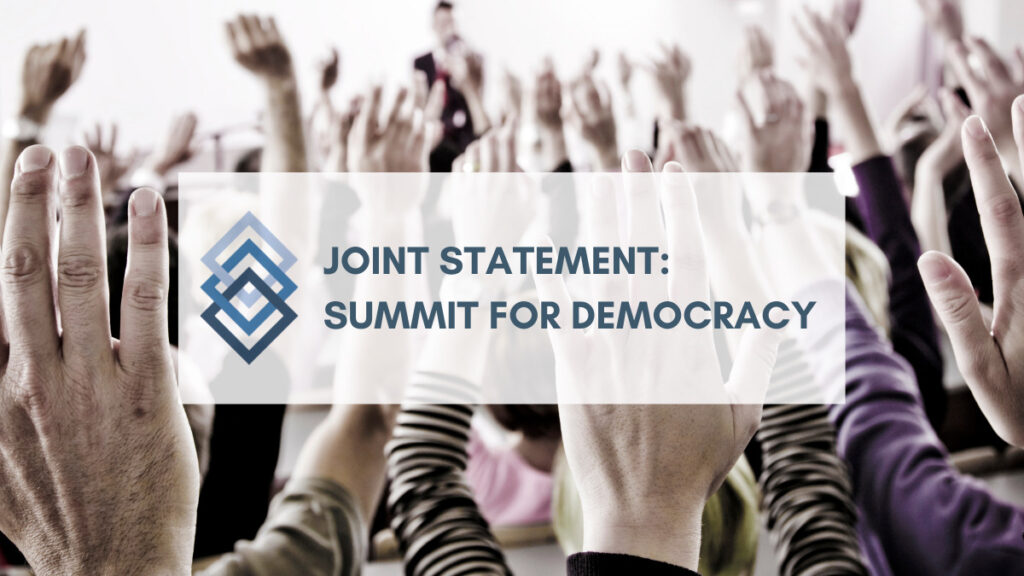Joint statement: Summit for Democracy

Before his inauguration as US President this year, Joe Biden committed to holding the world’s first international “Summit for Democracy”. The global Summit represents an opportunity for partners across the globe to reaffirm the importance of democratic governance after 15 years of democratic decline. Given the internal challenges facing democracies of all stripes and the challenges on the international stage, the time is ripe for reflection and for action.
That’s why NIMD has joined our fellow members of the European Partnership for Democracy (EPD), a network of not-for-profit organizations working on supporting democracy worldwide, to sign a statement on the Summit for Democracy. Together, we call for steps to be taken to ensure the Summit for Democracy fulfils its potential to support real democratic change.
We believe the Summit has the potential for supporting real democratic change, focusing minds on specific priorities and setting the stage for increased commitments. The organization of the Summit also brings up a number of key questions that have a bearing on its eventual success and impact.
What issues should be addressed? Where will it be held? Will it be a one-off event? Who should be invited?
All of these questions are perfectly valid considerations for the international community, in particular because it is vital that the Summit process does no harm to efforts to support democracy. The credibility of the Summit rests on a shared commitment to addressing the challenges facing democracy everywhere.
In this spirit, we recommend that European governments, the European Union institutions and our non-state partners:
1. Support the preparation of a Summit declaration that both recognizes the challenges to democracy and puts in place a number of concrete commitments
The Summit must aim for more than a declaration on the importance of democracy. A shared understanding of democratic challenges is needed to underline that the Summit is not simply a foreign policy exercise. As such, all participants will need to be prepared to debate uncomfortable domestic issues. This should help to contribute to a forward-looking Summit that helps to set the agenda for democracy globally.
Governments and non-state actors should be obliged to make specific commitments in relation to joining the Summit (either political and/or financial, both domestic and international), on a few well-defined dimensions. We stand ready to contribute thinking and ideas for these commitments based on our assessments and research on internal and external challenges. Given these challenges, the commitments must reflect the urgency needed to support democracy around the world.
2. Ensure that the Summit is part of a wider campaign of greater international cooperation on democracy support
We believe that the event would be more likely to succeed if it forms part of a much wider campaign to support and protect democracies. This process could include a series of run-up and follow-up events linked to the Summit. We stand ready to contribute to this.
3. Already prepare follow-up to the Summit
In order for commitments of participants to hold any value, they should be accompanied by some form of independent monitoring mechanism that could also offer support. The Summit should prompt states to accept mutual support in strengthening their democracies, e.g. through regular peer reviews. This does not need to entail the creation of a new body but can be streamlined into existing international structures.
4. Avoid the temptation to limit the Summit to one particular policy area or key component of democratic governance
We support taking a broad approach to the theme of the Summit. There is a danger that focusing on one specific issue could limit the effectiveness of the Summit. Discussions should therefore address 1) threats to key aspects of democratic governance – like inclusion, freedom of expression, polarization, anti-corruption, electoral integrity and 2) the key policy challenges that democracy must help address – like climate, global health, digital communication, economic recovery and social justice. Only by combining both areas can the Summit itself help set the international agenda for democratic protection and renewal.
5. Prioritize the inclusion of a wide diversity of actors from across the world
Given the potential pitfalls linked to the selection of official delegations, the Summit should be open to non-state actors. We support looking at ideas such as ensuring governments invite their political opposition. The Summit should also have a clear civil society dimension, where governments enter into dialogue with non-state actors, and where international civil society can present and debate a comprehensive set of recommendations to governments.
This is important both for the political signal it sends and for building the forward-looking and wide coalition that is needed to address democratic challenges.